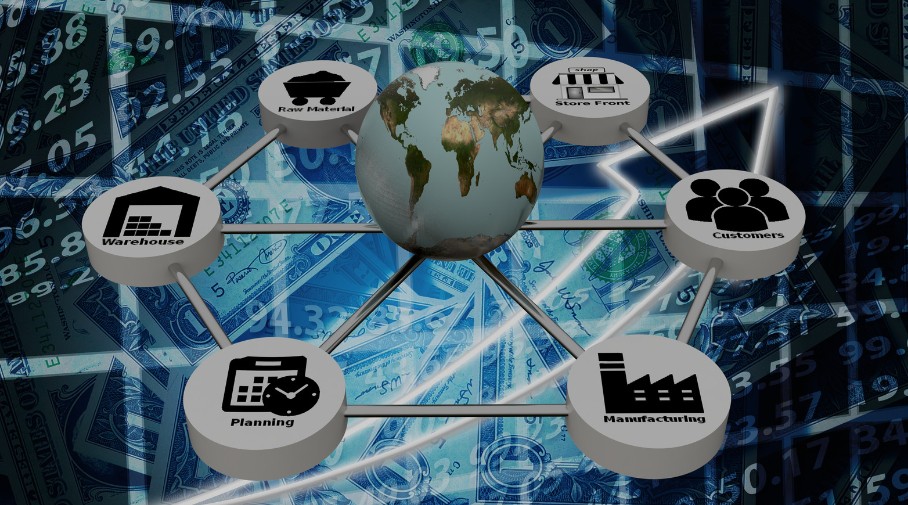The global supply chain has been facing unprecedented challenges in recent years, from disruptions caused by the COVID-19 pandemic to the ever-increasing demand for faster, more efficient, and more resilient logistics.
In this context, the role of Artificial Intelligence (AI) in optimizing the global supply chain has become increasingly crucial.
This comprehensive blog will explore how Artificial Intelligence Development Services, Enterprise AI Development Company, and Enterprise AI Chatbot Development Services are transforming the way supply chains operate, improving efficiency, and enhancing resilience.
Challenges in the Global Supply Chain

The global supply chain is a complex and dynamic system that faces a multitude of challenges, including:
- Demand Volatility: Unpredictable changes in consumer behavior and market conditions can lead to significant fluctuations in demand, making it difficult to plan and allocate resources effectively.
- Supply Disruptions: Natural disasters, geopolitical tensions, and unforeseen events can disrupt the flow of goods and materials, leading to supply chain bottlenecks and delays.
- Inventory Management: Balancing the right levels of inventory to meet customer demand while minimizing waste and storage costs is a constant challenge for supply chain managers.
- Transportation Optimization: Optimizing transportation routes, modes, and schedules to reduce costs, minimize emissions, and ensure on-time deliveries is a complex task.
- Visibility and Transparency: Lack of real-time data and visibility across the entire supply chain can hinder decision-making and lead to inefficiencies.
The Transformative Role of AI in Supply Chain Optimization
1. Demand Forecasting and Planning
Enterprise AI Development Company can leverage advanced machine learning algorithms to analyze historical sales data, market trends, and external factors to generate accurate demand forecasts.
This enables supply chain managers to plan production, inventory, and logistics more effectively, reducing the risk of over- or under-stocking.
2. Supply Chain Optimization
Artificial Intelligence Development Services can be employed to optimize various aspects of the supply chain, such as transportation routing, warehouse management, and inventory control.
By processing vast amounts of data and simulating different scenarios, AI-powered systems can identify the most efficient and cost-effective supply chain strategies.
3. Risk Mitigation and Resilience
AI-based systems can analyze real-time data from various sources, such as weather patterns, geopolitical events, and supplier performance, to detect potential supply chain disruptions.
This allows organizations to proactively implement contingency plans, mitigate risks, and build more resilient supply chains.
4. Predictive Maintenance
Enterprise AI Chatbot Development Services can be used to predict when equipment or machinery in the supply chain is likely to fail, enabling preventive maintenance and reducing unplanned downtime.
This can lead to improved asset utilization, reduced maintenance costs, and increased operational efficiency.
5. Autonomous Decision-Making
AI-driven systems can automate various decision-making processes within the supply chain, such as order processing, inventory replenishment, and transportation routing.
This can improve speed, consistency, and accuracy, freeing up human resources to focus on more strategic tasks.
6. Supply Chain Visibility and Transparency
By integrating AI-powered analytics and real-time tracking, supply chain managers can gain unprecedented visibility into the movement of goods, the performance of suppliers, and the overall health of the supply chain.
This enhanced transparency can lead to better decision-making and improved collaboration with partners.
Successful Implementation of AI in the Global Supply Chain

1. Data Infrastructure and Integration
Effective implementation of AI in the supply chain requires a robust data infrastructure that can collect, process, and integrate data from multiple sources, including enterprise resource planning (ERP) systems, transportation management systems, and external data providers.
2. Talent Development and Collaboration
Realizing the full potential of AI in the supply chain requires a skilled workforce with expertise in both supply chain management and AI/data science.
Enterprise AI Development Company can partner with educational institutions and training providers to develop talent and foster collaboration between domain experts and AI specialists.
3. Pilot Projects and Incremental Adoption
To mitigate risks and ensure a successful implementation, organizations should start with small-scale pilot projects that demonstrate the value of AI in specific supply chain use cases.
This approach allows for iterative learning, refinement, and the gradual expansion of AI-driven solutions across the entire supply chain.
4. Ethical Considerations and Governance
As AI becomes more prevalent in the supply chain, it is crucial to address ethical concerns, such as data privacy, algorithmic bias, and the impact on employment.
Developing clear governance frameworks and guidelines can help organizations navigate these challenges and ensure the responsible use of AI.
5. Collaboration and Ecosystem Development
Leveraging the expertise and resources of Artificial Intelligence Development Services, Enterprise AI Development Company, and Enterprise AI Chatbot Development Services can help organizations accelerate their AI adoption and drive innovation in the supply chain.
Collaborative efforts with technology partners, industry associations, and research institutions can foster the development of AI-powered supply chain solutions.
Case Study: Maersk’s Digital Transformation with AI

Maersk, one of the world’s largest container shipping companies, has been at the forefront of leveraging AI to optimize its global supply chain operations. The company has implemented several AI-driven initiatives to address the challenges it faces:
1. Predictive Maintenance
Maersk has developed an AI-powered predictive maintenance system that analyzes sensor data from its ships and equipment to identify potential failures before they occur. This has led to a significant reduction in unplanned downtime and maintenance costs.
2. Demand Forecasting:
By integrating AI-based demand forecasting models, Maersk has improved its ability to anticipate changes in customer demand and plan its shipping operations accordingly. This has resulted in better utilization of assets, reduced storage costs, and improved customer satisfaction.
3. Route Optimization:
Maersk has deployed AI algorithms to optimize its shipping routes, taking into account factors such as weather conditions, port congestion, and fuel efficiency. This has led to a decrease in fuel consumption, reduced emissions, and faster delivery times.
4. Intelligent Automation:
Maersk has leveraged Enterprise AI Chatbot Development Services to automate various administrative tasks, such as document processing and customer inquiries. This has improved efficiency, reduced errors, and freed up employees to focus on more strategic initiatives.
5. Ecosystem Collaboration:
Maersk has partnered with various technology providers, including startups and research institutions, to co-develop and integrate AI-powered solutions into its supply chain operations. This collaborative approach has enabled the company to stay at the forefront of supply chain innovation.
Through its AI-driven initiatives, Maersk has reported significant improvements in operational efficiency, cost savings, and customer satisfaction.
The company’s success story demonstrates the transformative potential of Artificial Intelligence Development Services in optimizing the global supply chain and serves as a model for other organizations to follow.
Final Take
The global supply chain is facing unprecedented challenges, and the role of Artificial Intelligence in optimizing its operations has become increasingly crucial.
By leveraging Enterprise AI Development Company, Enterprise AI Chatbot Development Services, and other Artificial Intelligence Development Services, organizations can address the key challenges of demand volatility, supply disruptions, inventory management, transportation optimization, and visibility.
The successful implementation of AI in the global supply chain requires a comprehensive approach, including the development of robust data infrastructure, talent acquisition and collaboration, pilot projects, ethical considerations, and ecosystem-wide partnerships.
Companies that embrace this transformative technology and adapt their supply chain strategies accordingly will be well-positioned to thrive in the ever-evolving global marketplace.
As the integration of AI in the supply chain continues to evolve, it will undoubtedly play a pivotal role in enhancing the efficiency, resilience, and sustainability of AI, ultimately delivering greater value to customers and driving the growth of the global economy.




